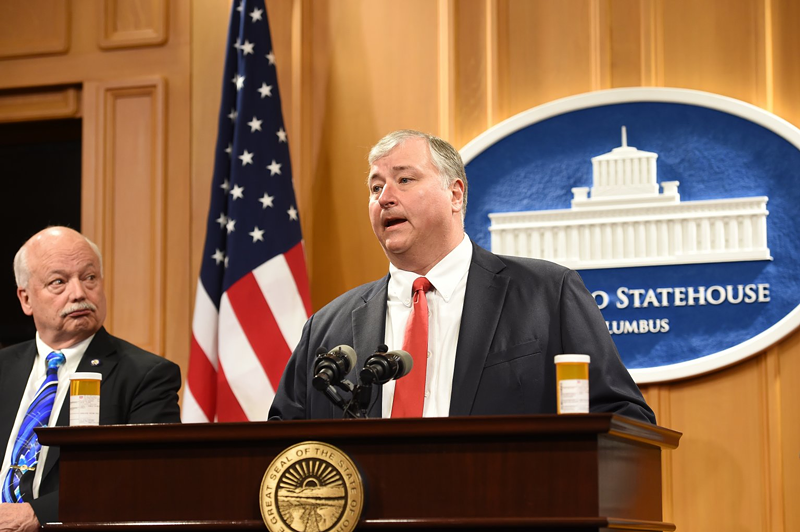Two men charged alongside former GOP House Speaker Larry Householder in an alleged racketeering operation channeled through the Ohio Statehouse pleaded guilty to one felony federal charge each Thursday afternoon.
The pleas mark the first known convictions in the Householder affair and an early victory for prosecutors. They also raise the possibility of the men testifying against remaining defendants in exchange for a more lenient sentencing.
Both FirstEnergy lobbyist Juan Cespedes, 41, and Householder’s longtime political strategist, Jeff Longstreth, 44, pleaded guilty in a video conferenced hearing in U.S. District Court in the Southern District of Ohio. They face up to 20 years in prison and up to $250,000 in fines.
U.S. District Judge Timothy Black indicated he would hold off on sentencing the two until the cases against other alleged conspirators are resolved.
Cespedes and Longstreth originally pleaded not guilty this summer after federal prosecutors accused them of working within a $61 million operation to take money from an unnamed company believed to be FirstEnergy Corp. They then used the funds to ensure the passage of legislation to bail out two nuclear plants formerly owned by a company affiliate, now known as Energy Harbor.
Members of the “enterprise,” as prosecutors referred to it, are said to have enriched themselves personally and politically, and used the funds, through different middleman entities, to help elect a slate of candidates perceived as likelier to support the legislation. Prosecutors estimate the bailout to be worth as much as $1.6 billion for FirstEnergy.
They also allegedly used the money to thwart a ballot referendum seeking to reverse the legislation, which tacks fees on energy ratepayers and businesses to fund the bailout. It also guts clean energy standards, subsidizes coal and solar plants around the state, and more.
Longstreth, according to facts set forth in the plea deal, organized Generation Now, a dark money group used as a pass-through for FirstEnergy funds, at Householder’s behest to benefit him and the enterprise.
His attorney did not return a request for comment.
Cespedes, per facts set forth in his plea deal, orchestrated payments from FirstEnergy to Generation Now, “in return for specific official action by Householder.”
Cespedes’ attorneys, Kaitlyn Stephens and Mark Collins, released a statement claiming their client pleaded guilty because after reviewing the prosecution’s evidence, “he realized he aided in the Householder conspiracy that was longstanding in existence two years prior” to his involvement.
They declined further comment.
Charging documents show federal prosecutors believe FirstEnergy began bankrolling Householder’s enterprise in March 2017.
Lobbying records show Cespedes registered as a lobbyist for FirstEnergy Solutions in May 2018. He registered to lobby for Energy Harbor in March 2020.
The plea agreements do not expressly indicate that either Cespedes or Longstreth will act as government witnesses. However, according to Case Western Reserve University law professor Michael Benza, this is typical in prosecutions that are still underway.
He said prosecutors are likely hoping the two can provide information to secure convictions of a bigger fish like Householder.
“Typically, the government starts wherever they get their entrance into an organization,” he said. “They start as low as they can and try to rise up the hierarchy.”
Entities like Generation Now, known as 501c(4) “social welfare” organizations, can be used to obfuscate the origins of political spending as they are not required to disclose their donors.
Along with Householder, Longstreth and Cespedes, contract lobbyists Neil Clark and Matt Borges were charged in the scandal as well. Clark, Borges and Householder have all pleaded not guilty.
U.S. Attorney for the Southern District of Ohio David DeVillers suggested in July that more charges could come from the investigation. In a statement Thursday, he said the investigation remains ongoing and declined further comment.
FirstEnergy has not been charged with any crime. However, Cespedes’ conviction inches the prosecution closer to FirstEnergy. The company, through a spokeswoman, declined to comment.
The company fired its CEO Charles Jones and two other executives Thursday, according to a news release issued after the hearings. It did so after an internal review “related to the government investigations” found the executives violated “certain FirstEnergy policies and its code of conduct.”
The guilty pleas were submitted five days before an election. The man at the center of the conspiracy, Householder, is up for reelection in Perry County. While he was dethroned as speaker, House Republicans, who control the chamber, voted against expelling him from his seat.
Householder’s attorneys did not respond to inquiries.
Legislation has been introduced to repeal House Bill 6, the bailout legislation, though it has yet to come up for a committee or floor vote, despite tremendous pressure since Householder’s July arrest.
Meanwhile, lawsuits have poured in against FirstEnergy relating to the scandal from Ohio Attorney General Dave Yost, two of Ohio’s largest cities, and company investors.
Rep. Dave Leland, D-Columbus, said in a statement the plea deals show the General Assembly must repeal HB 6.
“Today’s plea deals affirmed what was already widely accepted to be true — that a crime was committed in the passage of HB 6,” he said. “But it’s little comfort to Ohioans to hear about criminal convictions while the product of those crimes, legislation taking over $1 billion out of their pockets and giving it to energy corporations, is still law today because of Republican leadership.”
This story was originally published by the Ohio Capital Journal and republished here with permission.


